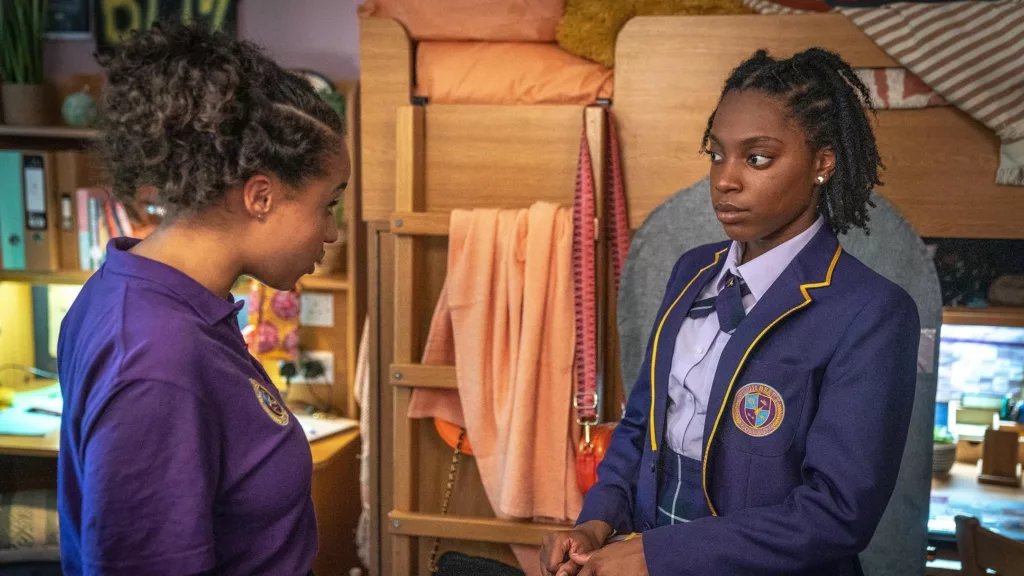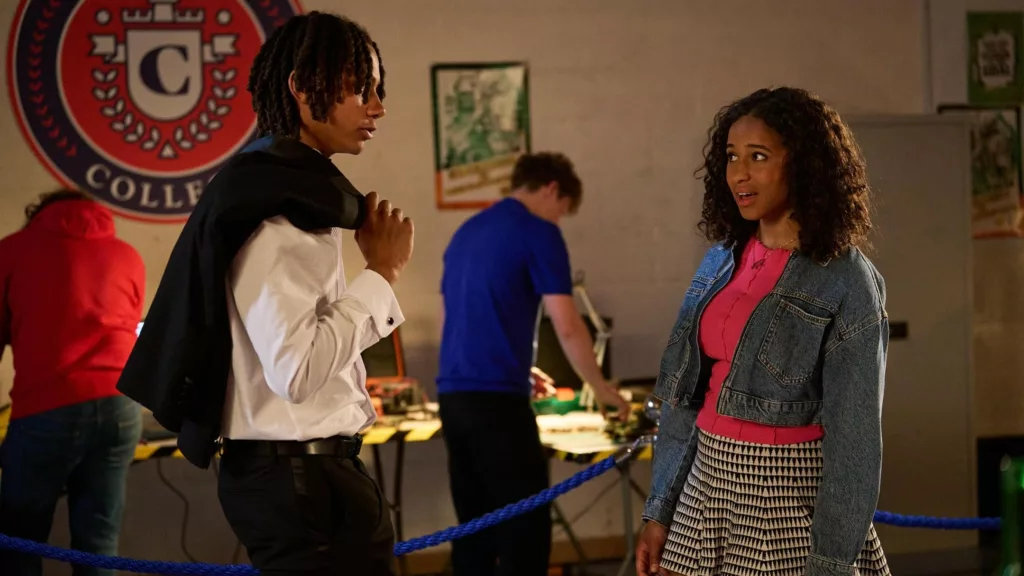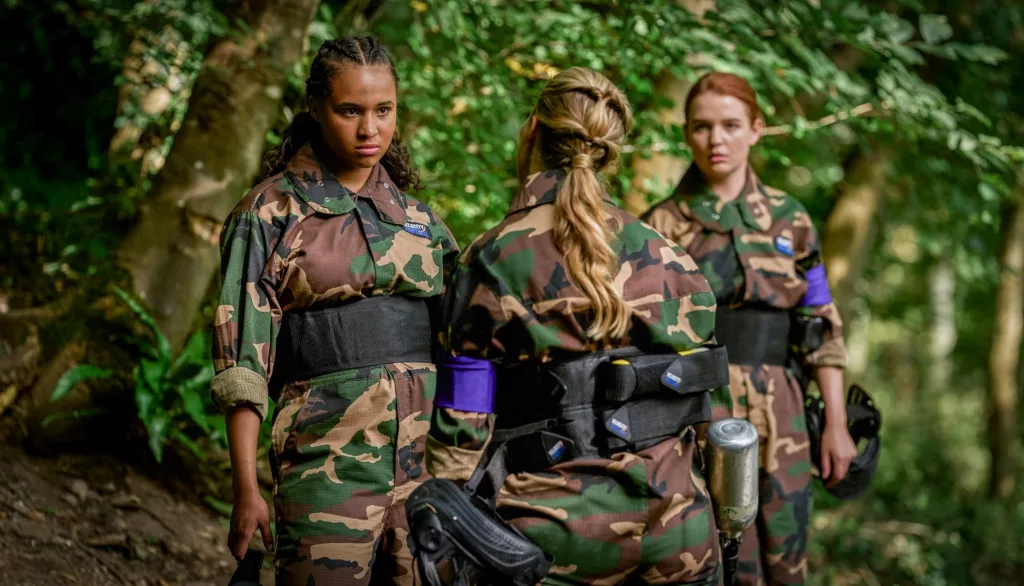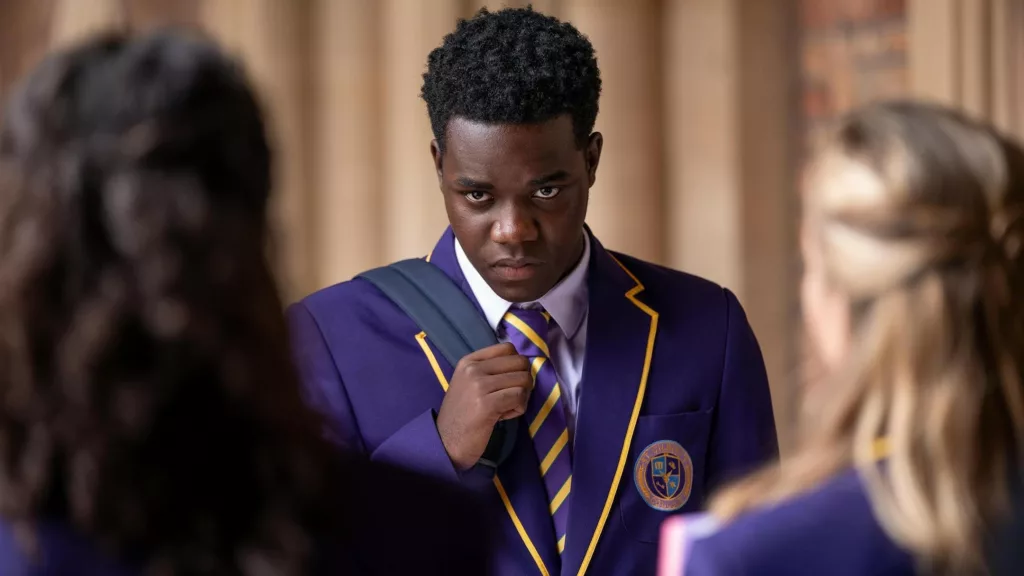The British television series “Boarders” offers a fresh and compelling take on the coming-of-age narrative. Set within the hallowed halls of the elite St. Gilbert’s boarding school, the show follows a quintet of Black students from underprivileged backgrounds who are awarded scholarships to attend the prestigious institution. This unique premise immediately captivates, inverting the traditional narrative of privileged youth by spotlighting the experiences of outsiders thrust into a world of affluence and tradition.
At the heart of the story are the five central characters: the quick-tempered but brilliant Jaheim, the outspoken activist Leah, the artistic and introspective Omar, the entrepreneurial polyglot Toby, and the studious Femi, burdened by his family’s high expectations. Each character brings a distinct personality and set of struggles, offering a nuanced exploration of identity, ambition, and the challenges of navigating unfamiliar social terrain.
What sets “Boarders” apart is its deft blending of comedy, drama, and incisive social commentary. While the fish-out-of-water premise lends itself to humor and lighthearted moments, the series doesn’t shy away from tackling weightier subjects like race, class, privilege, and systemic inequalities. This seamless integration of genres, coupled with the diverse perspectives of the central characters, creates a richly textured narrative that entertains while prompting thoughtful discourse.
Compelling Storylines Tackle Thorny Issues
At its core, “Boarders” follows the intertwining journeys of its five protagonists as they navigate the treacherous social landscape of St. Gilbert’s. Jaheim, initially antagonistic towards his new surroundings, finds himself embroiled in a brewing conflict with Rupert, the privileged ringleader whose viral video sparked the scholarship program. This volatile dynamic encapsulates the series’ exploration of race, class divides, and the inherent tensions that arise when different worlds collide.
Leah’s storyline tackles head-on the contentious issues of diversity and tokenism within elite institutions. Her fierce determination to challenge the school’s offensive depictions of its colonial past and establish an African-Caribbean society puts her at odds with the administration and certain students. Leah’s arc poignantly illustrates the uphill battle faced by underrepresented voices seeking change within entrenched systems.
While Jaheim and Leah confront the establishment, characters like Omar and Toby navigate the social minefield of St. Gilbert’s with diverse coping mechanisms. Omar, a talented artist and openly gay, finds solace in his pursuit of joining a secret society, offering a glimpse into the world of adolescent escapism. Toby, a linguistic savant, embraces his entrepreneurial spirit, often drawing assumptions and stereotypes from his peers.
Femi’s journey is perhaps the most introspective, as he grapples with the weight of his Nigerian family’s expectations and the temptation to fully assimilate into St. Gilbert’s elitist culture. His arc highlights the personal sacrifices and compromises that underprivileged students may face when presented with such opportunities.
Although the initial episodes establish a brisk pace and set up the central conflicts, the narrative occasionally falters in its handling of time and character development. Certain arcs and transformations feel abrupt or inconsistent, perhaps a byproduct of the season’s compact six-episode structure. Nevertheless, the overarching narrative remains engaging, deftly balancing moments of levity with poignant social critiques and character-driven drama.
Captivating Characters Brought to Life
The true beating heart of “Boarders” lies in its rich ensemble of characters, each skillfully embodied by a talented young actor. At the center is Jaheim, portrayed by Josh Tedeku with a magnetic blend of confidence and vulnerability. Tedeku’s performance captures the character’s quick temper and defiance, but also hints at the insecurities simmering beneath the surface as he navigates the unfamiliar terrain of St. Gilbert’s.
Jodie Campbell’s turn as Leah is a tour de force, imbuing the outspoken activist with unwavering conviction and passion. Campbell’s ability to convey Leah’s righteous fury while still allowing glimpses of her softer side is a testament to her nuanced acting prowess. One particularly poignant moment sees Leah confront the school’s offensive colonial portraiture, her fiery determination leaving a lasting impact.
Myles Kamwendo’s portrayal of Omar, the introspective artist and resident outsider, is a masterclass in understated authenticity. Kamwendo effortlessly captures Omar’s vulnerability and his yearning for acceptance, particularly in his quest to join the elusive secret society. His subtle yet powerful performance is a grounding force amidst the series’ more boisterous personalities.
Sekou Diaby’s charismatic portrayal of Toby, the streetwise entrepreneur, is a showstopper. Diaby’s ability to seamlessly blend Toby’s sharp wit and linguistic brilliance with an underlying current of loneliness and a desire for recognition is truly remarkable. His comedic timing and chemistry with co-star Assa Kanoute (as Abby) are particularly noteworthy.
Rounding out the central quintet is Aruna Jalloh as Femi, the dutiful son grappling with the weight of familial expectations. Jalloh’s performance is a study in restraint, masterfully conveying Femi’s internal tug-of-war between his desire for acceptance and his fear of disappointing his loved ones. His interactions with his Nigerian family provide some of the series’ most emotionally resonant moments.
Beyond the core cast, several supporting players leave indelible impressions. Assa Kanoute’s nuanced portrayal of Abby, a biracial student struggling with her identity, is a highlight, as is Tallulah Grieve’s multifaceted turn as the privileged yet conflicted Beatrix. Even the seemingly one-note antagonist Rupert, brought to life by Harry Gilby, evolves into a more complex figure as the season progresses.
Throughout the six episodes, each character experiences growth and transformation, some more pronounced than others. While certain developments may feel rushed due to the compact season structure, the ensemble’s commitment to their roles ensures that even the subtlest character beats resonate with authenticity.
Incisive Social Commentary Amidst Humor
Beneath its comedic surface, “Boarders” wields a sharp critical lens, dissecting thorny themes of identity, privilege, and the systemic inequalities that permeate elite educational institutions. The series unflinchingly tackles issues of race and class, illuminating the myriad challenges faced by its protagonists as they navigate the treacherous waters of St. Gilbert’s.
At its core, “Boarders” is a profound exploration of identity – how it is shaped, challenged, and ultimately embraced. Characters like Abby and Femi grapple with the complexities of their biracial and immigrant identities, respectively, as they seek acceptance in an environment that often demands conformity. Meanwhile, Leah’s unwavering pride in her heritage fuels her activism, serving as a counterpoint to the school’s entrenched traditions and power structures.
The notion of privilege is dissected with nuance, as the series contrasts the affluent backgrounds of St. Gilbert’s students with the harsh realities faced by the scholarship recipients. From microaggressions to outright hostility, the show shines a light on the insidious ways in which privilege manifests, often leaving the underprivileged characters feeling alienated and tokenized.
“Boarders” pulls no punches in its portrayal of elite educational institutions as bastions of elitism and systemic inequality. The school’s administration, embodied by Headmaster Bernard and the overbearing Carol Watlington-Geese, is depicted as more concerned with preserving the institution’s image than addressing its deep-rooted issues. This critique is further compounded by the well-intentioned yet ineffectual efforts of the “inclusion team,” whose superficial attempts at diversity ring hollow.
Remarkably, the series manages to balance its weighty social commentary with a deft comedic touch. Moments of levity, often derived from the fish-out-of-water experiences of the scholarship students, provide welcome respites from the show’s more intense explorations. This tonal duality not only enhances the overall viewing experience but also reflects the complexities of navigating intersecting identities and societal divides.
Through its multifaceted approach, “Boarders” ultimately emerges as a potent examination of the human experience, one that challenges preconceptions and prompts introspection. Its ability to seamlessly blend humor and poignant social critique is a testament to the creative team’s deft storytelling prowess.
Skillful Craft Elevates the Narrative
“Boarders” shines not only in its substantive storytelling but also in the technical artistry that brings the narrative to life. The series boasts a distinct visual style, deftly capturing the contrasting worlds of its characters through judicious cinematography and production design.
Directors Ethosheia Hylton and Sarmad Masud imbue the series with a palpable sense of atmosphere, seamlessly transitioning between the opulent grandeur of St. Gilbert’s and the grittier environs of the scholarship students’ home neighborhoods. This deliberate juxtaposition of settings amplifies the characters’ sense of displacement, heightening the emotional impact of their journeys.
Equally impressive is the show’s writing, which strikes a delicate balance between biting social commentary and character-driven humor. Creator Daniel Lawrence Taylor’s dialogue crackles with authenticity, deftly capturing the cadences and linguistic idiosyncrasies of the diverse ensemble. From Toby’s multilingual quips to the boys’ playful banter, the writing infuses each character with a distinct voice, further enhancing their relatability.
Perhaps the series’ greatest strength lies in its deft genre-blending. “Boarders” seamlessly weaves together elements of comedy, drama, and poignant social critique, creating a rich tapestry of tones and emotions. One moment, viewers may find themselves laughing at the absurdities of the St. Gilbert’s elite; the next, they are confronted with a sobering examination of systemic inequality. This tonal dexterity is a testament to the creative team’s skill and vision, elevating the series beyond a mere coming-of-age tale into a multifaceted exploration of identity and societal divides.
Underpinning the show’s technical prowess is a palpable sense of authenticity, a commitment to presenting its characters and their experiences with nuance and depth. From the performances to the writing, every aspect of “Boarders” feels grounded in a lived reality, lending weight and resonance to its narratives.
Resonant and Impactful Television
In its inaugural season, “Boarders” emerges as a standout series, deftly blending incisive social commentary with character-driven narratives and a deft comedic touch. From its talented ensemble cast to its skillful genre-blending, the show consistently impresses, delivering a thought-provoking and entertaining exploration of identity, privilege, and the complexities of navigating disparate worlds.
While the compact six-episode structure occasionally results in narratives feeling rushed or underdeveloped, this minor quibble does little to diminish the overall impact of the series. “Boarders” excels in its nuanced portrayal of complex themes, never resorting to heavy-handed sermonizing or caricatures.
For audiences seeking a fresh and insightful take on the coming-of-age narrative, “Boarders” is an essential watch. Its perspectives on race, class, and systemic inequality are both timely and universally resonant, ensuring that its messages will resonate long after the final credits roll. Fans of series like “Dear White People” and “Sex Education” will find much to appreciate in this sharply written, superbly acted drama.
Ultimately, “Boarders” is a triumph – a series that entertains while prompting introspection, challenging preconceptions, and leaving an indelible mark on the viewer. With its deft balance of humor and poignancy, it cements its place as a standout addition to the pantheon of exceptional television storytelling.
The Review
Boarders
"Boarders" is a triumph of storytelling that deftly blends incisive social commentary with rich character drama and deft comedic touches. Its talented ensemble, nuanced exploration of complex themes, and seamless genre-blending coalesce into a viewing experience that is both entertaining and thought-provoking. While its compact structure occasionally results in narratives feeling rushed, this minor quibble does little to diminish the overall impact of this resonant and impactful series.
PROS
- Excellent ensemble cast with standout performances
- Nuanced exploration of complex themes like race, class, privilege
- Seamless blend of comedy, drama, and social commentary
- Authentic portrayal of characters and their experiences
- Sharp, witty writing and natural dialogue
- Distinct visual style and atmosphere
- Thought-provoking examination of systemic inequalities
- Fresh take on the coming-of-age narrative
CONS
- Compact 6-episode structure leads to some rushed/underdeveloped narratives
- Pacing and handling of time can feel inconsistent at times
- Some character arcs could have been fleshed out further




























